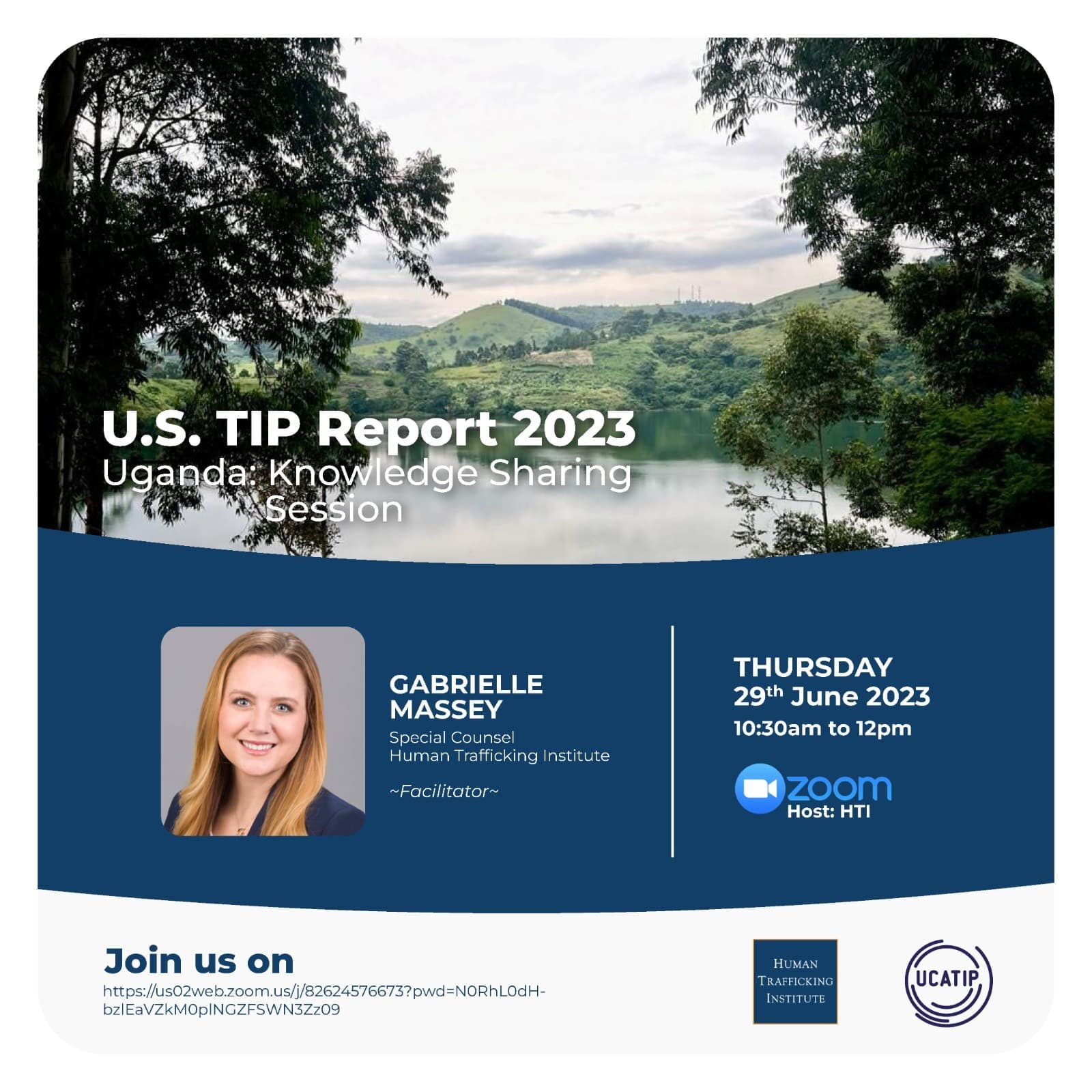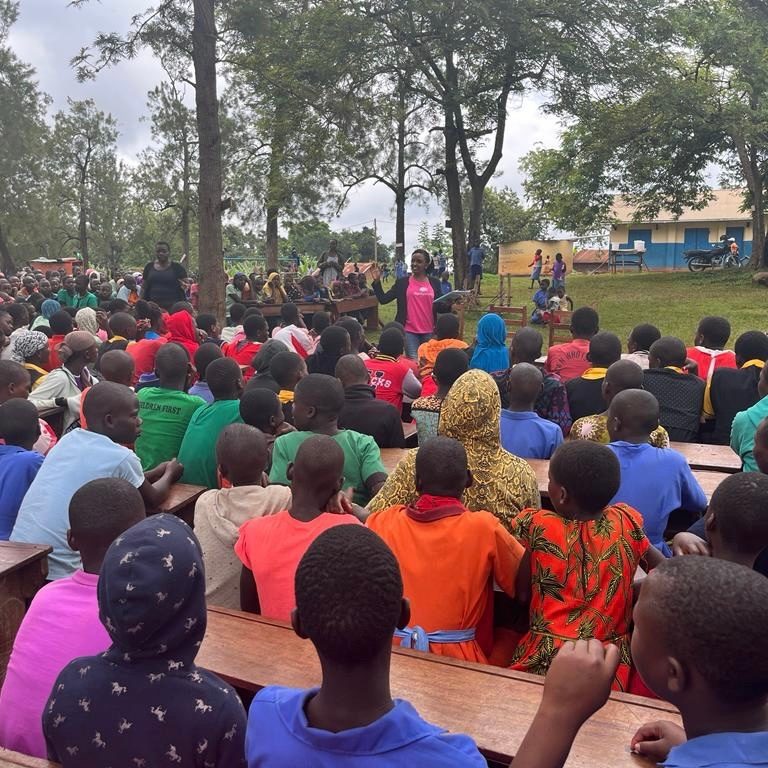Collaborative Efforts to Combat Human Trafficking: Insights from the 2023 U.S TIP Report
In June, the Coalition Against Trafficking in Persons-Uganda (CATIP-U) partnered with the Human Trafficking Institute to host a knowledge-sharing session and exchange. This online session was centred around the release of the 2023 U.S. Trafficking in Persons (TIP) Report, a key annual publication that sheds light on the state of human trafficking across the globe. The session aimed to deepen Ugandan stakeholder’s understanding of Uganda’s position in the fight against trafficking and chart a path forward for collective action.
For over two decades, the U.S. TIP Report has been an essential tool in the arsenal of anti-trafficking advocates worldwide. It provides a comprehensive overview of human trafficking, ranking countries through a tier system based on their anti-trafficking efforts. This system not only serves as a benchmark for nations to measure their progress but also offers a framework for enhancing responses to human trafficking. The 2023 report, like its predecessors, plays a pivotal role in informed decision-making, coordination among stakeholders, and identifying growth opportunities.
Despite the immense challenges posed by the COVID-19 pandemic, Uganda retained its Tier 2 status in the 2023 U.S. TIP Report, a testament to its unwavering commitment to combating human trafficking. This achievement underscores Uganda’s resilience and dedication to improving its standing in the global fight against trafficking.
The 2023 U.S. TIP Report lauded Uganda for several noteworthy achievements in its anti-trafficking efforts, including:
- Record-breaking trafficker convictions in a single year, marking a significant milestone in the region’s fight against trafficking.
- A remarkable increase in human trafficking prosecutions, demonstrating an escalated enforcement drive.
- Strengthened training initiatives for government officials and community leaders, fostering improved coordination.
- The creation of child-friendly interview rooms and the introduction of anonymous victim testimony, prioritizing victim rights and confidentiality.
- The pioneering establishment of District Task Forces for tracking persons, promoting a collaborative approach.
- Inauguration of a 24-hour toll-free hotline for reporting trafficking incidents, encouraging citizen engagement in the fight against trafficking.
The 2023 report’s recommendations provided a blueprint for actionable steps to further enhance Uganda’s anti-trafficking efforts. These recommendations included:
- Expanding the availability of shelters, housing, and specialised services for trafficking victims.
- Enacting victim witness assistance legislation and implementing comprehensive assistance programmes.
- Strengthening protective measures for Ugandan trafficking victims exploited abroad.
- Deepening the partnership between law enforcement and prosecutors to expedite judicial proceedings and enhance evidence gathering.
- Bolstering efforts to investigate and prosecute alleged traffickers, with a focus on just penalties
- Systematic victim identification through the implementation of referral guidelines
- Rigorous oversight and regulation of labour recruitment entities
- Approving the establishment of an anti-trafficking department within the national police force, underpinned by sufficient funding
- Ratifying the 2000 Human Trafficking in Persons Protocol, showcasing commitment to global anti-trafficking initiatives
The knowledge-sharing session witnessed active participation from a diverse group of stakeholders, all of whom offered thoughtful reactions to the report and its recommendations. Attendees appreciated the strides made and insights gained while also acknowledging areas that require intensified efforts. The discussions highlighted the importance of sensitization, support for single mothers, victim and witness protection, and collaboration between government and civil society.
In response to the session’s deliberations, attendees collectively emphasised the importance of translating dialogues into actionable strategies. Key areas of focus included: Engaging the government for financial support towards shelters and victim services, Advocating for the enactment of witness protection legislation, Promoting the ratification of relevant anti-trafficking protocols and Advocacy for enhanced victim services.
During the session, various participants contributed valuable insights and perspectives on the recommendations outlined in the 2023 U.S. Trafficking in Persons (TIP) Report and the strategies needed to move forward. Their thoughtful remarks further enriched the discussion and reinforced the collaborative approach to combating human trafficking in Uganda.
- Engaging with Recommendations: Several participants expressed enthusiasm for the recommendations put forth in the report. They highlighted the alignment between the report’s suggestions and their aspirations for Uganda’s anti-trafficking efforts. They appreciated the focus on adult male shelters and acknowledged the existing gap in this area. This acknowledgement was seen as a growth opportunity for the country. Attendees encouraged each other to harness the recommendations to shape their collective work and amplify their efforts.
- Government Support and Funding: There was a consensus on the importance of government involvement and financial support for anti-trafficking initiatives. The participants recognised the challenges posed by the current budget allocation for combating trafficking. They collectively emphasised the need to secure more substantial government funding for shelters and victim support services. They acknowledged that this financial commitment would be instrumental in advancing Uganda’s Tier 1 ranking aspirations.
- Witness Protection Legislation and Shelters: The discussions gravitated towards the significance of witness protection legislation, a vital aspect that influences the provision of shelters and victim assistance. Participants emphasised that such legislation could offer a holistic approach to both shelter and protection needs, serving as a comprehensive framework. The sentiment was that the witness protection bill, already recognised by the Ugandan government, could potentially address these concerns if properly enacted.
- Collective Advocacy and Strategy: To effectively drive change, the participants underscored the necessity of a collective strategy. They considered engaging key government figures, like the Permanent Secretary of the Ministry of Internal Affairs, as an avenue for initiating discussions around funding shelters and victim support. Furthermore, there was a proposal to involve the Minister of Justice and Constitutional Affairs, or other pertinent ministries, to facilitate discussions around reintroducing and advancing the witness protection bill. Attendees encouraged collaborative dialogue and emphasised the importance of persuasively presenting the financial implications and societal benefits of these efforts to gain government support.
The insights shared during the knowledge-sharing session highlighted the collaborative spirit and determination of diverse stakeholders in Uganda’s anti-trafficking endeavors. The participants’ dedication to transforming recommendations into actionable strategies reflected their commitment to creating a safer environment for Ugandans vulnerable to trafficking. By joining forces and harnessing government support, Uganda can pave the way towards achieving Tier 1 status and strengthening its position in the global fight against human trafficking. The session showcased the power of uniting various stakeholders around a common cause and creating a roadmap for meaningful change. Together, they are forging a brighter future, free from the scourge.


